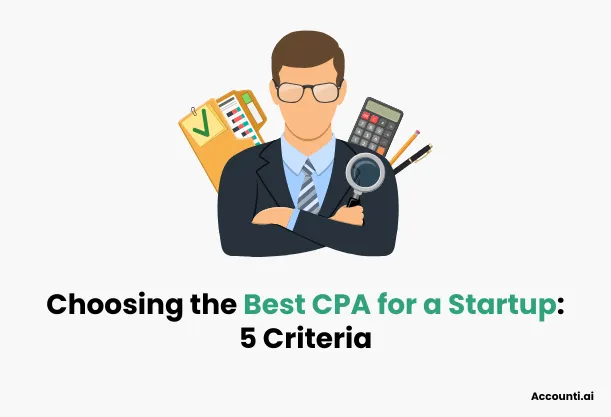
Choosing the Best CPA for a Startup: 5 Criteria
Starting your own business is like setting out on an adventurous road trip. You’ve got big dreams, a few supplies, and a vague idea of where you’re headed. But what happens when you hit financial roadblocks? That’s where a CPA (Certified Public Accountant) comes in, acting like a trusty co-pilot to help you navigate the twists and turns of managing your startup’s finances.
Choosing the right CPA for your startup is critical because this decision can directly impact your business's success. In this article, I’ll guide you through the five essential criteria for selecting the best CPA for your startup.
What is a CPA and Why Does Your Startup Need One?
What is a CPA?
A CPA, or Certified Public Accountant, is a professional who has passed rigorous exams, obtained state licensing, and gained expertise in financial accounting, tax preparation, auditing, and more. While anyone can call themselves an accountant, only a licensed CPA has met these strict qualifications.
Why Does Your Startup Need a CPA?
Startups often face unique financial challenges: managing limited budgets, tracking expenses, complying with tax regulations, and even seeking investor funding. A CPA brings order to financial chaos. They’ll help you:
- Ensure compliance with local, state, and federal tax laws.
- Develop financial forecasts and business plans.
- Optimize your tax strategy to save money.
- Provide strategic advice for growth and scaling.
Imagine trying to handle all these tasks while running your startup! A CPA isn’t just an expense—it’s an investment in your company’s future.
Criteria #1: Experience with Startups
Why Does Experience with Startups Matter?
Working with startups is a completely different ball game compared to working with established corporations. Startups are fast-paced, unpredictable, and often financially tight. A CPA experienced in the startup world will understand your unique needs and offer tailored solutions.
For instance, they’ll know how to help you set up QuickBooks, create cash flow projections, or manage investor funding.
What to Look For:
- Previous experience working with startups or entrepreneurs.
- Knowledge of financial software used by startups.
- A proactive approach to problem-solving (you’ll need someone who can anticipate issues, not just react to them).
Questions to Ask:
- Have you worked with startups before? If so, what industries?
- Can you share examples of how you helped a startup achieve its financial goals?
- How do you handle the fast-paced nature of startups?
By asking these questions, you can assess whether a CPA truly understands what your startup needs to succeed.
Criteria #2: Industry Knowledge
The Importance of Industry Expertise
Every industry has its quirks. For example, tech startups might deal with intellectual property issues, while food startups often navigate health regulations and inventory management. A CPA familiar with your industry will know the nuances and regulations you’ll face.
Choosing a CPA with industry-specific knowledge means they can hit the ground running without needing a crash course in your business model.
Examples of Industry Challenges
- Tech startups: Managing R&D tax credits and software development costs.
- Retail startups: Tracking inventory and managing sales tax.
- Healthcare startups: Navigating HIPAA compliance and medical equipment depreciation.
How to Spot an Industry-Savvy CPA
- Look for certifications or additional training specific to your industry.
- Ask for references from other businesses in your field.
- Evaluate whether they understand your jargon or processes during the initial consultation.
Criteria #3: Licensing and Credentials
Why Licensing Matters
Choosing a licensed CPA ensures you’re working with someone who has met strict education and ethical standards. You wouldn’t trust an unlicensed contractor to build your house, so why would you trust an unlicensed accountant with your finances?
What to Verify
- State Licensing: Verify their license through your state’s board of accountancy website.
- Additional Credentials: Look for certifications like CFA (Chartered Financial Analyst) or CFP (Certified Financial Planner), depending on your needs.
- Ongoing Education: CPAs are required to maintain their knowledge through continuing education. Ask about recent courses or training they’ve attended.
Red Flags
- They can’t provide their license number.
- They avoid discussing their educational background or certifications.
- Their knowledge seems outdated or overly generalized.
Criteria #4: Communication and Availability
The Importance of Clear Communication
Imagine your CPA sends you an email full of accounting jargon you don’t understand. Would you feel confident in their abilities? Probably not. Great communication is about simplifying complex concepts and making sure you always feel in control of your finances.
Availability is Key
Startups often experience financial emergencies. You’ll need a CPA who’s available when you need them—not someone who takes two weeks to reply to an email.
What to Watch For
- Proactive Updates: Do they reach out with reminders for tax deadlines or changes in regulations?
- Quick Responses: Do they reply within a reasonable timeframe?
- Clear Explanations: Are they patient when explaining complex topics?
Red Flags
- They don’t ask detailed questions about your business during the initial consultation.
- They seem disorganized or forgetful about important details.
- They have a pattern of delayed responses.
Criteria #5: Cost and Value for Money
Balancing Budget and Quality
Startups often operate on tight budgets, so cost is always a concern. However, hiring the cheapest CPA isn’t always the smartest move. A quality CPA might charge more but save you thousands in taxes, penalties, or inefficiencies.
Understanding Fee Structures
- Hourly Rates: Common for smaller engagements or one-time tasks.
- Flat Fees: Best for ongoing services like monthly bookkeeping.
- Retainers: Useful for startups needing frequent advice or consultations.
Ask for a detailed breakdown of what’s included in their fees. It’s better to understand upfront than to get surprised by hidden charges later.
How to Evaluate ROI
- Compare their fees to the potential savings they can deliver (e.g., tax reductions or better financial decisions).
- Ask about success stories or case studies from similar startups.
- Consider the long-term value of having accurate financial guidance.
Tips for Choosing the Right CPA
1. Interview Multiple Candidates
Don’t settle for the first CPA you find. Interview at least three candidates to compare their experience, communication style, and fees.
2. Check References and Reviews
Reach out to past clients or check online reviews. This will give you insight into their reputation and reliability.
3. Test the Waters
Many CPAs offer free consultations or trial periods. Use this opportunity to gauge their approachability and expertise.
Conclusion
Choosing the right CPA for your startup isn’t just about finding someone to crunch numbers—it’s about finding a partner who understands your vision, supports your growth, and helps you navigate the complexities of financial management. By focusing on experience, industry knowledge, credentials, communication, and cost, you’ll be well on your way to finding the perfect match.
So, start your search today and make this important investment in your startup’s success!
FAQs
What is the best accounting method for startups?
For startups, the accrual accounting method is generally recommended. Unlike cash basis accounting, which records transactions only when cash changes hands, accrual accounting recognizes revenues and expenses when they are earned or incurred, regardless of actual payment. This approach provides a more accurate and comprehensive view of a company's financial health, which is crucial for informed decision-making and attracting investors. Additionally, certain states mandate the use of accrual accounting for businesses, making it a necessary choice for compliance.
What type of accountant is best for a small business?
For small businesses, partnering with a Certified Public Accountant (CPA) is highly beneficial. CPAs possess the expertise to navigate complex financial records, ensure compliance with tax laws, and provide strategic financial advice tailored to small business needs. They can assist with bookkeeping, tax preparation, financial planning, and more, offering a comprehensive approach to managing your business's finances.
What are the two most essential qualities for a CPA?
The two most essential qualities for a CPA are:
- Integrity: Upholding ethical standards and honesty in all financial dealings is paramount for a CPA, ensuring trustworthiness and reliability.
- Attention to Detail: Precision in managing financial records and transactions is crucial to prevent errors and ensure accurate financial reporting.
What are the 4 skills necessary to become a CPA?
To excel as a CPA, one should develop the following four skills:
- Analytical Ability: The capacity to assess complex financial data and discern trends or issues.
- Communication Skills: Effectively conveying financial information and advice to clients and stakeholders.
- Technical Proficiency: Mastery of accounting software and staying updated with the latest financial regulations and standards.
- Problem-Solving Skills: The ability to devise strategic solutions for financial challenges and optimize business performance.
Do you need a CPA to be successful?
While not mandatory, engaging a CPA can significantly enhance a business's success. CPAs offer valuable insights into financial planning, tax strategies, and regulatory compliance, which can lead to better financial management and informed decision-making. Their expertise allows business owners to focus on core operations, potentially leading to increased profitability and growth.

 Rohit Kapoor
Rohit Kapoor

